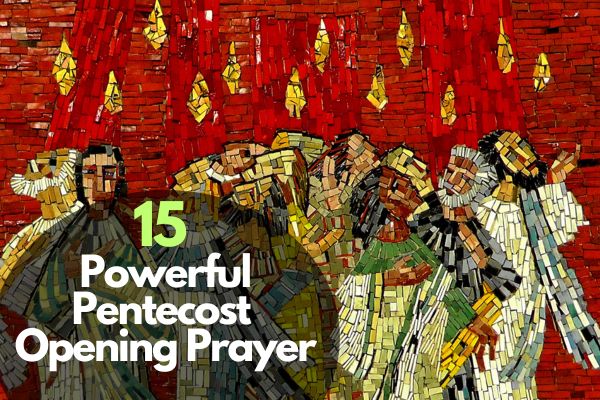In the realm of faith and spirituality, one question that often arises is “Does God Hear The Prayers Of Sinners?” It’s a topic that delves into the very core of belief and calls for a nuanced understanding of divine mercy, human imperfection, and the transformative power of prayer. To explore this matter comprehensively, we’ll examine what sin and sinners mean in the context of religion, consider the nature of God’s listening, explore relevant Bible verses, and analyze the parable of the prodigal son. We’ll also delve into the significance of repentance, the role of intercessors, and address common misconceptions. Ultimately, we’ll uncover the profound concept of redemption through prayer and divine mercy.
1. Does God Hear the Prayers of Sinners?
Before we dive into whether God hears the prayers of sinners, it’s essential to clarify what we mean by “sin” and “sinners.” In religious terms, sin is often defined as an action, thought, or behavior that goes against the divine will or moral law. Sinners are individuals who commit these actions or harbor sinful thoughts. Understanding these terms helps us address the complexity of this topic.
2. The Nature of God’s Listening
God’s Omniscience
To comprehend whether God hears the prayers of sinners, we must acknowledge the divine attribute of omniscience. According to most religious beliefs, God is all-knowing, which means He is aware of every aspect of our lives, including our thoughts and intentions.
The Belief in Repentance
Many religious teachings emphasize the importance of repentance. This is the act of acknowledging one’s sins, feeling remorse, and seeking forgiveness. It is believed that sincere repentance can bridge the gap between sinners and God.
3. Bible Verses on God Hearing Sinners
To gain insight into whether God hears the prayers of sinners, we can turn to various Bible verses that shed light on this topic.
Luke 18:9-14
In this parable, Jesus tells the story of a Pharisee and a tax collector who entered the temple to pray. The Pharisee, self-righteous and proud, prayed about his own virtues. In contrast, the tax collector, a sinner, humbly asked for God’s mercy. Jesus concludes by stating that it was the tax collector who went home justified, for “all those who exalt themselves will be humbled, and those who humble themselves will be exalted.”
Psalm 66:18
The Psalms contain numerous references to God’s willingness to hear prayers. In Psalm 66:18, it is said, “If I had cherished sin in my heart, the Lord would not have listened.” This verse suggests that a heart clinging to sin might hinder communication with the divine.
Isaiah 59:2
Isaiah 59:2 emphasizes the potential separation between humanity and God due to iniquities: “But your iniquities have separated you from your God; your sins have hidden his face from you so that he will not hear.”
1 John 1:9
1 John 1:9 provides hope and guidance for sinners: “If we confess our sins, he is faithful and just and will forgive us our sins and purify us from all unrighteousness.”
4. The Parable of the Prodigal Son
To understand God’s response to the prayers of sinners, we can turn to the well-known parable of the prodigal son in Luke 15:11-32. This story tells of a young man who squanders his inheritance on a reckless lifestyle and eventually returns to his father in repentance. The father not only welcomes him back but celebrates his return with joy. This parable illustrates the theme of God’s boundless mercy and willingness to hear the prayers of those who repent.
5. The Importance of Repentance
A Change of Heart
Repentance involves a fundamental change of heart. It signifies a turning away from sinful behaviors and a sincere desire to live in accordance with God’s will.
Seeking Forgiveness
One of the central elements of repentance is seeking forgiveness. In many religious traditions, it is believed that God is merciful and forgiving, especially when individuals sincerely seek His pardon.
6. The Role of Intercessors
Intercessory prayer is the act of praying on behalf of others. It is believed that individuals can act as intermediaries between God and those who seek His mercy. This practice highlights the notion that prayers for sinners can be heard and answered.
7. Common Misconceptions
God’s Unconditional Love
Some believe in the idea of God’s unconditional love, suggesting that God listens to all prayers, regardless of one’s state of sin. This perspective emphasizes the loving and compassionate nature of God.
The Nature of Sin
Others argue that not all sins are equal, and God’s response to prayers may vary based on the nature of the sin and the sincerity of repentance.
The nature of sin is a complex and deeply philosophical concept that has been explored and debated for centuries across various religious, moral, and ethical frameworks. Sin is often understood as a transgression of divine or moral laws, and its nature varies depending on one’s cultural, religious, or philosophical perspective. Here, we’ll delve into some of the key aspects of the nature of sin.
Moral and Ethical Perspective
From a secular standpoint, sin can be seen as a violation of ethical and moral principles. It represents actions or behaviors that are considered wrong or harmful within a particular societal or cultural context. These may include lying, stealing, harming others, or breaking societal rules.
Religious Perspective
In many religious traditions, sin is fundamentally a transgression against divine laws or the will of a higher power. For example, in Christianity, sin is viewed as a separation from God due to human disobedience. In Islam, sin is seen as a violation of Allah’s commands. The nature of sin in religious contexts is often categorized as either sins of commission (wrongful actions) or sins of omission (failure to do what is right).
Psychological Perspective
Sin can also be examined from a psychological standpoint. It is often associated with guilt and remorse, which are powerful emotions that can have a significant impact on an individual’s mental and emotional well-being. The nature of sin in this context involves the internal struggle between one’s desires and the moral or ethical standards one hold.
Cultural and Historical Variability
The nature of sin can vary greatly across cultures and time periods. What is considered sinful in one culture or era may not be seen as such in another. This reflects the subjective and evolving nature of morality and ethics.
The Role of Intention
In many discussions of sin, intention plays a crucial role. The nature of sin can differ based on whether an action is committed deliberately, recklessly, or inadvertently. Intent often determines the severity of the sin in the eyes of many ethical and religious systems.
The Possibility of Redemption
Many belief systems also incorporate the concept of redemption, whereby individuals can seek forgiveness or atonement for their sins. The nature of sin, in this context, is intertwined with the possibility of personal growth, transformation, and reconciliation with one’s beliefs or a higher power.
Social and Legal Dimensions
In addition to moral and religious dimensions, sin has social and legal implications. Acts that are considered sinful in a particular society may be codified as crimes. The justice system often adjudicates such acts based on societal norms and laws.
In summary, the nature of sin is multifaceted and deeply rooted in cultural, religious, ethical, and philosophical traditions. It reflects the human struggle with morality, ethics, and the relationship between individual actions and the broader moral order. Understanding the nature of sin is essential for individuals seeking to lead a virtuous life, reconcile with their beliefs, or navigate the complexities of morality and ethics in a diverse and ever-changing world.
8. The Power of Redemption
At the heart of this topic lies the concept of redemption through prayer and divine mercy. It suggests that sincere prayers, coupled with genuine repentance, can transform sinners into individuals who are forgiven and embraced by God’s love.
“The Power of Redemption: Does God Hear the Prayers of Sinners?”
The question of whether God hears the prayers of sinners is one that has intrigued and perplexed theologians, philosophers, and individuals seeking spiritual solace for centuries. At the heart of this query lies the notion of redemption – the transformative process of turning away from a life of sin and seeking forgiveness and reconciliation with the divine. To understand the power of redemption and whether God listens to the prayers of sinners, we must explore the theological and philosophical dimensions of this profound concept.
Redemption is a central theme in many religious traditions, emphasizing the potential for spiritual rebirth and transformation. It embodies the idea that regardless of one’s past actions, there is always a path to forgiveness and renewal. In Christianity, for instance, the concept of redemption is closely tied to the belief that Jesus Christ’s sacrifice on the cross offers salvation and the opportunity for sinners to be reconciled with God. Other faiths have similar notions of redemption, albeit with their unique interpretations and rituals.
The idea that God might not hear the prayers of sinners stems from the belief that one’s sins may create a barrier between the individual and the divine. In this view, sin is seen as a separation from God’s grace, and to bridge that gap, one must repent and seek forgiveness earnestly. This perspective holds that God is more inclined to hear the prayers of those who genuinely desire transformation and a closer relationship with the divine.
However, there are alternative theological perspectives that argue that God is always attentive to the prayers of all, regardless of their past transgressions. These viewpoints emphasize the all-encompassing love and mercy of the divine, suggesting that God’s willingness to hear and respond to sinners is an integral part of the redemption process. In this light, the act of turning to God in prayer, even in the midst of one’s sins, can be a crucial step in the journey of redemption.
The parable of the prodigal son in the Christian Bible serves as a poignant illustration of God’s readiness to hear the prayers of sinners. In this story, a wayward son squanders his inheritance in a life of indulgence and sin but ultimately returns home with a repentant heart. His father, representing God’s boundless love and forgiveness, welcomes him with open arms, demonstrating that God is not only willing to hear the prayers of sinners but also eager to extend forgiveness and grace.
In many other religious traditions, similar stories and teachings emphasize the idea of divine compassion and the importance of repentance in the process of redemption. They serve as a reminder that, for those seeking to mend their ways and rebuild their relationship with the divine, the power of redemption is always within reach.
In conclusion, the question of whether God hears the prayers of sinners is a matter of profound spiritual significance. The power of redemption lies in the belief that God’s mercy and forgiveness are accessible to all, irrespective of their past actions. While some argue that genuine repentance is a prerequisite for God’s attentive ear, others maintain that God’s love is unconditional and eternal, and He is ever willing to listen to the pleas of sinners. Ultimately, the power of redemption reminds us that, in the eyes of the divine, the opportunity for transformation and renewal is a gift available to all who seek it, regardless of their past transgressions.
Conclusion
The question of whether God hears the prayers of sinners is a profound one that touches the core of faith and spirituality. While the answer may vary based on individual beliefs, it is clear that many religious teachings emphasize the importance of repentance, sincerity, and the transformative power of prayer. The parable of the prodigal son serves as a powerful illustration of God’s boundless mercy. Ultimately, it’s the change of heart, the seeking of forgiveness, and the belief in divine compassion that can bridge the gap between sinners and God. In the world of faith, the impossible becomes possible through the profound concept of redemption.
FAQs on God Hearing the Prayers of Sinners
1. Is there a specific formula for repentance that guarantees God will hear our prayers?
Repentance is a heartfelt process that involves acknowledging one’s sins, feeling remorse, and seeking forgiveness. There is no fixed formula, but sincerity is key.
2. Are there any sins that God cannot forgive?
Many religious beliefs emphasize God’s capacity for forgiveness. It is often the sincerity of repentance that matters most.
3. What is the role of intercessors in praying for sinners?
Intercessors act as intermediaries, praying on behalf of sinners to seek God’s mercy. Their role is seen as important in many religious traditions.






